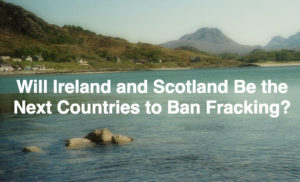
In a historic vote at the beginning of this year, Ireland opted in favour of a law that will make the green island the world’s first country to fully divest from fossil fuels. This goes even further than the decision by the 2015 decision of Norwegian parliament to divest the country’s sovereign wealth fund from dozens of coal-related investments.
And it’s not the only clear movement of the Celtic Tiger towards a much needed post-fossil future. On October 27, a bill calling for a fracking ban passed its first hurdle in the Irish House of Representatives (Dáil Éireann). In the meantime, Irish officials have also decided to undertake a public consultation on the provisions of this bill together with the Joint Research Programme on the Impacts of Hydraulic Fracturing on the Environment and Human Health, led by the Irish Environmental Protection Agency.
On top of that, Northern Ireland has opted for planning legislation to put a halt to fracking. The current Strategic Planning Policy Statement states that “in relation to unconventional hydrocarbon extraction there should be a presumption against their exploitation until there is sufficient and robust evidence on all environmental impacts.“ However, since this wording is still pretty weak in view of the overwhelming evidence for the negative impacts of fracking on the environment, public health and the climate, only a clear and permanent ban on fracking will ensure the protection of the people and wonderful landscape of Northern Ireland.
At the same time, Scots are also moving – hopefully – towards a permanent ban on fracking. In 2016, the Scottish parliament narrowly voted in favour of a ban. Looking at the ever growing evidence of the negative impacts, the decision of the Scottish parliament was nothing but a consequent follow-up-vote on the announced moratorium from January 2015. While the vote of the parliament is non-binding, the government nevertheless felt the need to act: In January 2017, the Scottish Government started a four-month consultation on “the future of unconventional oil and gas in Scotland“. This is a crucial step in our united fight to ban fracking everywhere in the world. We all can help and support the Friends of the Earth Scotland campaign by taking action and telling the government why fracking should never be allowed to go ahead in Scotland.
Dragon Ships Bring LNG From the US
But while the Celtic nations are rightfully and consequently moving forward in their attempts to put an end to this absurd debate over whether fracking serves anyone but the frackers themselves, so-called “dragon ships” loaded with fracked hydrocarbons continue to regularly penetrate the Scottish shores.
INEOS, a chemical company still partly based in the tax-haven of mountainous Switzerland, started in September 2016 to ship fracked liquified natural gas (LNG) from the Marcus Hook Terminal of Pennsylvania to the Grangemouth petrochemical plant in Scotland. The main shareholder of INEOS, billionaire Jim Ratcliffe, is not only proud to have brought the union Unite to its knees over pension and payment cuts at his self-proclaimed “Battle for Grangemouth,” but he has been a major lobbbyist for fracking and shale gas in the UK and beyond. Crossing the Atlantic with the “Shale Gas for Europe” slogans on the Chinese-made Dragon Ships, INEOS apparently doesn’t care about the negative impacts on the people and the environment in Pennsylvannia, where the fracking fever for the Dragon Ships and others rages.
The last few years of the European fracking debate have been driven by the absurd argument that we need fracking to “free European citizens“ from their dependence on Russian gas. Now comes the INEOS “fracking fun factor“ into play: The realization that the fracked hydrocarbons from the US are shipped across the Atlantic to use them for petrochemicals and plastics.
Food & Water Watch – our mother NGO – has recently uncovered in detail how fracking supports the plastic industry, which has reaped under-the-radar benefits from the environmentally destructive fracking boom. Unfortunately, as we all know, plastics production is inherently wasteful—and much of that waste ends up in our oceans and surface waters. A 2015 study estimated that nearly 200 coastal countries generated over 600 billion pounds of plastic waste in 2010 — and between 11 and 27 billion pounds of this ended up in the oceans.
No wonder that a recent survey found out that plastic – mainly in the form of small pellets called nurdles – are found littering 73 percent of 279 UK shorelines. According to the environmental charity Fidra and its Great Nurdle Hunt project, Scotland’s “beautiful coasts and the delicate marine environment that surrounds it are under serious threat from plastic litter”. It’s also no wonder that the Great Nurdle Hunt map shows that the unique Forth of Firth, where the petrochemical plant of Grangemouth is located, is at risk from plastics and toxins. Furthermore, scientists have also found that about 15 percent of puffins, endangered birds which are Scotland’s natural treasures, have plastic in their stomachs.
It’s time to stop this absurdity once and for all. We don’t need more plastics, petrochemicals or fracked hydrocarbons. What we do need is fresh air, clear drinking water and an intact environment.
A fracking ban in Ireland and Scotland sounds like a very rational step in the right direction – much more rational than shipping fracked hydrocarbons over the Atlantic to generate plastic that will finally turn the same ocean bit by bit into a cesspool.
I bet the old Celts would have told us the same.


